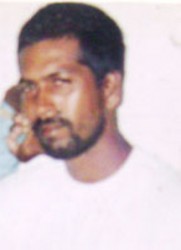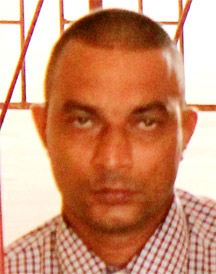Sentenced to 70 years in jail for murder, Lloyd Rampersaud has challenged both his conviction and the sentence, with his lawyer saying that the trial judge failed to direct the jury on how to deal with glaring “discrepancies” in the evidence presented.
Through his attorney George Thomas, Rampersaud is contending, among other things, that there exists no evidence to suggest that he killed, or inflicted upon the deceased, Munilall Mangru, called ‘Boy,’ the injuries which caused his death.
Rampersaud had been jointly charged with the capital offence along with his brother Roy Rampersaud. At the conclusion of their trial on March 8th, 2013, however, the jury found only Lloyd guilty, while unanimously acquitting his brother.

At the hearing of the appeal yesterday morning before acting Chancellor Yonette Cummings-Edwards and Justices of Appeal Rishi Persaud and Dawn Gregory, Thomas pointed out what the court agreed to be a “major discrepancy” in the case.
On this point, counsel questioned the veracity of the conviction, while noting that it had been the testimony of the deceased’s sister that she had seen him alive and well on February 22nd, 2009, though the state is contending that the man had met his demise the day before.
Thomas opined that in light of the woman’s testimony, it raises the question/possibility as to whether Munilall may have met his end at the hands of someone else, especially since the pathologist had said that given the injuries inflicted on the deceased, he would have lived no more than four minutes after.
Lloyd had told police in a caution statement, which had been admitted into evidence, that he and his friend, Shaeed Baksh, called ‘Towley,’ were carrying out a robbery on Mangru when they killed him.
According the statement, Lloyd said, “Towley vice he and me lash he with a piece of wood on he face and me see he tongue come out. Towley then cuff he up pon he face and me then tek out all he money from he crotch.”
Prosecutor Teshana Lake said that the pathologist’s findings after examining the body, were consistent with the account provided by Lloyd regarding the injuries and where they had been inflicted.
She reminded, too, that Dr. Nehaul Singh, who performed the autopsy, gave evidence that Munilall would have died within four minutes of suffering the injuries.
It was this that Thomas took issue with, arguing vehemently that since the dead man’s sister remained resolute that she had seen him after the time he should have already been dead, supposing, but not admitting that his client did in fact inflict the injuries, Munilall should have already been dead within that four-minute time period on February 21st, so that there would have been no way his sister could then see him the following day.
Thomas said, too, that there could not be any confusion as to who it was that the woman had seen, since she would undisputedly know her brother and had even testified to having briefly spoken to him as well.
It was against this background that counsel raised the possibility that the man could have been killed after his sister had seen him on February 22nd and by someone other than his client.
He also raised the possibility of a new intervening act being at work which could have caused Munilall’s death and not injuries the state is contending were inflicted by his client.
For her part, however, Lake said that notwithstanding that arguments proffered by the defence, the indictment itself was not specific to a particular date, but rather a period which included between February 21st and 24th of 2009.
She advanced, too, that one of the elements which the state has to prove in establishing liability for capital offences, is that the death of the deceased must occur within a year and a day of the injuries inflicted.
Clearly, she said, Munilall succumbed well within that time frame.
But Thomas was unwavering that the discrepancy remained troubling, when one tries to reconcile that with the clear evidence given by Dr Singh that Munilall should have been a dead man no more than four minutes after being beaten.
Lake, however, remained adamant that those arguments did not take away from the fact that it was the appellant who, as he had revealed in his statement to police, killed Munilall, while adding that the jury had also found so.
Chancellor Cummings-Edwards described the date variation as indeed being a “major discrepancy,” and asked, as George next went on to point out, whether the trial judge should not have provided directions to the jury as to how it needed to treat with such a discrepancy.
The chancellor questioned whether the jurors were just left to “roam,” or whether they are to be taken as having sufficient common sense in dealing with such a glaring discrepancy.
In response, Lake pointed to the latter.
With the appeal having been heard, the court has said that it will dispatch notices informing both sides when its ruling will be rendered.
Outlining the grounds for his appeal, Mangru said that trial judge Navindra Singh erred in law in directing the jury on joint enterprise and on parties to offences and their liability.
He is contending, too, that the judge erred in admitting the caution statement in the trial.
In handing down the 70-year sentence, Justice Singh said he found Lloyd’s action to have been deliberate and brutal.
He started at a base of 60 years before the aggravating factors in the case were considered.
Lloyd had admitted to the police in his statement that he, Baksh, and Mangru went to buy $20,000 in cocaine from someone in his street.
Lloyd also said in the statement that after they bought the cocaine, the three of them went under a bridge at Triumph public road and smoked it. He said, “Towley then bling me and tell me dat Boy get nuff money and we plan to rob he. Towley vice he and me lash he with a piece of wood on he face and me see he tongue come out. Towley then cuff he up pon he face and me then tek out all he money from he crotch.”
Baksh was one of the men charged with the murder but the charge against him was dropped by the Director of Public Prosecutions.
Lloyd also said the total amount of money Mangru had on him was $40,000 and it was divided between him and Baksh and he added that afterward he went home and he told his brother Roy what happened. He said that he also went to drink high wine and smoked out the money he stole from Mangru.
Baksh’s deposition, which was admitted as evidence in the trial, had implicated the Rampersauds in the crime.
Mangru’s body was found under a bridge linking Mon Repos and Triumph, on the East Coast of Demerara.





